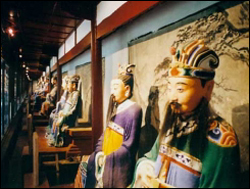|
The spice comes from chilies. Fresh, dried, fried, stewed, powdered and pickled, these are the soul of Sichuan seasoning and should be the provincial emblem. Its more incendiary partner, the hua jiao or flower pepper (prickly ash), is the ingredient that brings about the feeling your mouth has been injected with local anesthetic. It is widely believed the humid climate in Chengdu encourages people to eat heavily spiced food and the potent pepper may help reduce internal dampness. I can't verify that theory, as my internal dampness became a volcanic eruption. But one must persevere in the name of adventure. With regional cuisine boasting 5,000 different dishes, you're not likely to get stuck for choice. Standards like ma po dou fu, pock-marked Mother Chen's beancurd topped with minced beef, floating in chili bean sauce, and gong bao ji ding, a spicy chicken and peanut dish known overseas as kung pao chicken, both originate in Chengdu. Likewise, zhong shui zhao, delicious crescent-shaped dumplings in a blistering sauce of chili and sesame oil. But perhaps of all the taste sensations Chengdu is home to, this is where the Hot was put in Pot. Hot Pot, a kind of supercharged fondue using wafer thin slices of lamb, beef and mutton here turns up the heat on its cousins in northern China. Fragrant oil and fistfuls of spice float dangerously in each bubbling pot, like an arsonist laying an ambush.
The real pleasure of having had the equivalent of hot coals rolled across your tongue comes afterwards, as you take a sip of Sichuan tea and feel the liquid magically sooth a mouth from hell. The tea also seems to extract the subtlety and intricately layered flavors of what many consider among the world's finest cuisine. A taste sensation of the most unexpected kind, it's a must for any gastronome. While there is a proliferation of low-budget eateries, the Veranda Anshun Bridge Restaurant beckons those looking for something different. Chengdu's only restaurant built on a river bridge and possibly the only one in China-is opulent dining deluxe and a must if you like being spoild by super efficient service that is choreographed with military precision and executed by waitresses who could easily double as models. The food isn't bad either. Marble columns of the Anshun Bridge so impressed Marco Polo on his Chinese travels that they are immortalized in his epic work The Travels Of Marco Polo. Night views along the Anshun River from the restaurant are dazzling but while the glass walls allow you to look out, it also gives every bridge crossing local the chance to gawk openly at diners trying to enjoy exotic dishes like sauteed bull frogs and chili-fried snails Sichuan style.
|

Wu Hou Temple[Photo: CRIENGLISH.com]
|
The strip on the east side of the river near the Verandah Bridge Restaurant is fast developing into the city's premier bar street. White-collar nouveau riche have elevated Jin Jie Bar's couch sprawling, bohemian decor into the city's top port of call, probably due toe tall tasty jugs of locally brewed beer.
Must-sees
Wu Hou Temple, in the southern suburbs, particularly honoring counselor and military advisor Zhuge Liang, ancient China's outstanding politician and military strategist., livig during the Three Kingdoms (220-280AD) period. Old cypresses and classic red walls surround the Temple, cosseting its most valuable cultural relic, a 3.67-meter stele built in 809AD.
On the other side of town, the 17th century Wenshu Monastery, the largest Buddhist temple in Chengdu, is famed for its tranquil garden courtyards and popular vegetarian restaurant. It also features one of the busiest tea houses in the city. Under a cloud of incense smoke and chirping birds, chill out in bamboo chairs, buy a sprinkling of tealeaves and have your cup refilled with hot water indefinitely. Chew on an infinite supply of sunflower seeds and let the world go by.
A good way of walking off all that spicy food is to take an evening stroll along Chun Xi Lu, Chengdu's famed pedestrian street. It's like walking head-on into a people-packed light bulb. Or pick up some of the city's much sought after exquisite embroidery, brocade, lacquerware, bamboo or plaited straw goods.
|